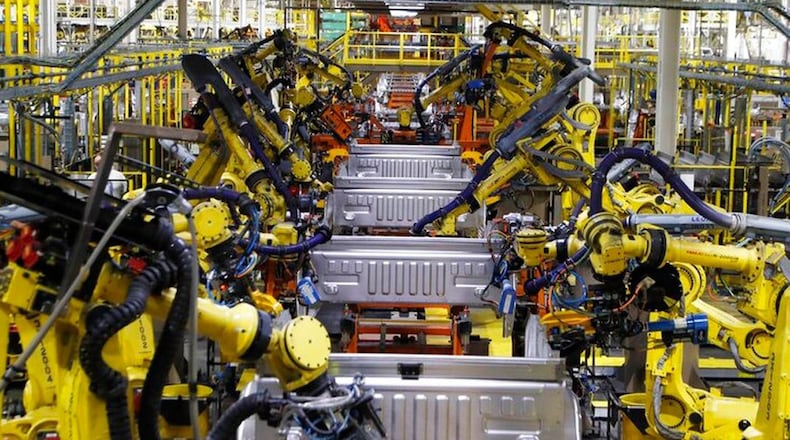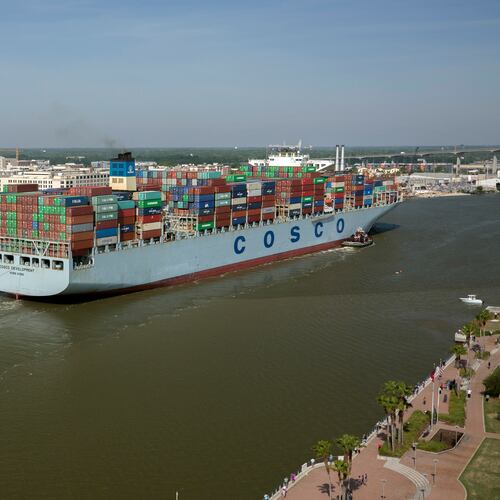Editor’s note: This story has been updated to reflect the end of the trading day.
Top Georgia stocks took a beating Thursday along with the broader markets, and a major business group urged world leaders to reach accords on trade amid fears of likely economic disruption from President Donald Trump’s reciprocal tariffs.
Global markets tumbled Thursday as the gravity of the sweeping tariffs and the prospect of likely foreign retaliation sunk in. The Dow lost more than 1,600 points — about 4% — while the S&P 500 sank nearly 5%. The Nasdaq lost about 6%.
The sell-off hit multiple sectors, including Georgia companies such as heavy equipment maker AGCO, auto dealer Asbury Automotive, homebuilders Beazer Homes and PulteGroup, Delta Air Lines, financial technology firm Global Payments, trading company Intercontinental Exchange and UPS.
Bright spots included Aflac, Coca-Cola and Georgia Power parent Southern Co., which were up for the day.
On Wednesday, Trump announced tariffs of at least 10% on most all imports into the U.S., plus steeper import taxes on goods from many of the nation’s top trading partners.
Goods from the European Union would be hit with 20% tariffs, 24% for Japan, 32% from Taiwan and 46% from Vietnam. Tariffs against Chinese goods, for instance, will be 54% when considering reciprocal and earlier levies.
The 10% levies against most nations are scheduled to take effect over the weekend, with the larger individualized taxes on countries Trump has deemed to be bad actors taking effect April 9.
Credit: AP
Credit: AP
On Thursday, 25% tariffs on foreign automobiles and auto parts take effect. Other import taxes enacted by Trump since he took office include levies on foreign steel and aluminum.
A tariff is a tax on goods or services from outside of our country brought into the U.S., and economists view them as inflationary. Tariffs are slapped on products at the port of entry and paid by the importer. Those taxes typically are passed along by businesses to the buyers of products, whether the buyers are manufacturers obtaining parts that go into other things or a consumer shopping at a store or online.
“We remain deeply concerned about the impact of tariffs on industries across metro Atlanta and Georgia. No one wins a trade war,” Jerry Parrish, chief economist at the Metro Atlanta Chamber, said in a statement. “We know the economic effects will have a negative impact far beyond individual sectors, affecting businesses, workers, and consumers alike.”
Credit: JOHN SPINK / AJC
Credit: JOHN SPINK / AJC
Prices might not immediately rise on all goods. Some companies brought a surplus of finished goods and supplies into the U.S. from overseas, racing ahead of expected tariffs. Some importers and manufacturers will choose to eat some of the costs. But not all can.
“The uncertainty and unpredictable environment surrounding these policies create serious challenges for businesses,” Parrish said. “Stability and clarity are what leads to the kind of strong economic environment Atlanta and Georgia have enjoyed in recent decades.”
Trump has pitched tariffs to raise revenue, prod foreign companies to invest in the U.S. and create jobs and to rewrite what he considers unfair trade relations.
“Our county and its taxpayers have been ripped off for more than 50 years, but it is not going to happen anymore,” Trump said during a White House event announcing the tariffs.
Re-shoring of manufacturing jobs, however, will take time as factories are costly and take years to build. The U.S. is the top import market in the world and domestic companies cannot supply all things American consumers and businesses need and those suppliers will also likely raise prices.
The size of the tariffs could bring countries to the negotiating table, suggesting the full brunt of the taxes might not hit businesses and consumers if agreements can be reached to mitigate damage. But countries also were preparing countermeasures.
Many economists fear if the tariffs remain in effect, they will exacerbate inflation and blunt economic growth, and some warn the trade war could tip the U.S. — and potentially much of the world — into recession.
Joshua Bolten, CEO of Business Roundtable, which represents the chief executives of the nation’s top companies, said in a statement that the group supports the administration’s goal of reaching fairer trade deals for American exports and expanding access to foreign markets.
“However, universal tariffs ranging from 10-50% run the risk of causing major harm to American manufacturers, workers, families and exporters,” Bolten said. “Damage to the U.S. economy will increase the longer the tariffs are in place and may be exacerbated by retaliatory measures.”
Bolten urged world leaders to quickly reach agreements to create a fairer playing field and remove the import taxes.
“While negotiations are underway, we strongly encourage the administration to implement additional reasonable exemptions and put in place a transparent, predictable exclusion process,” Bolten said.
Advancing American Freedom, a conservative group founded by Mike Pence, the vice president during Trump’s first term, was sharply critical of the tariffs.
“The Trump Tariff Tax is the largest peacetime tax hike in U.S. history,” Pence said on X, formerly Twitter, citing a report from the group. “These Tariffs are nearly (10 times) the size of those imposed during the Trump-Pence Administration and will cost American families over $3,500 per year.”
But the tariffs were cheered by the president’s supporters.
“This is fair. Whether it’s our military or economy, other countries have taken advantage of the U.S. for far too long. That time is over,” U.S. Rep. Mike Collins, R-Jackson, said on X.
About the Author
Keep Reading
The Latest
Featured




